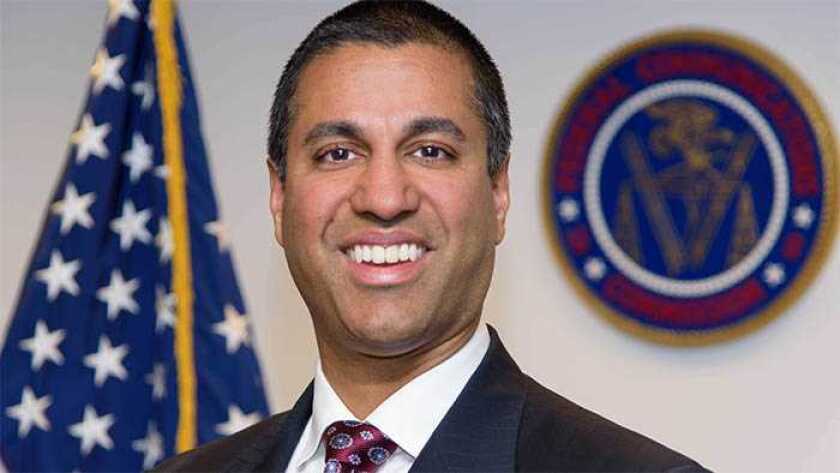Pai (pictured), who became a member of the Federal Communications Commission (FCC) in May 2012 and chairman on 23 January 2017 after Trump’s inauguration, said last night that he will leave on 20 January 2021, inauguration day for the new president.
“Our nation’s communications networks are now faster, stronger, and more widely deployed than ever before,” he said.
Pai’s departure leaves incoming the incoming president with two decisions — firstly, Biden has to find a Democrat willing to serve on the five-member FCC: commissioners are traditionally split three-to-two, with the majority belonging to the current president’s party.
The FCC has always been politically oriented. The FCC’s own list of commissioners, back to its creation in 1934, gives the party affiliation of each. There are only two independents, both appointed in the 1940s, in a sea of Democrats and Republicans.
Then Biden must appoint one of the three Democrat members to chair the FCC.
The FCC already has two Democrat commissioners, Jessica Rosenworcel, appointed in 2012 and then again in 2017 after a brief interval, and Geoffrey Starks, appointed in January 2019.
Rosenworcel is seen as a strong candidate for the leadership, but so is Mignon Clyburn, a strong advocate of net neutrality, who left the regulator in 2018 after nine years, including a spell as acting chair, finally departing when the FCC abandoned net neutrality.
Last month Biden appointed Clyburn to his presidential transition team, perhaps giving her the edge, if she is in a race with Rosenworcel.
However Clyburn will have to unravel a potential conflict of interest: she has just joined the board of cloud communications company RingCentral.
Both she and Rosenworcel have been strong advocates of net neutrality, a policy that is likely to return after 20 January.
When Clyburn left the FCC she said in a tweet: “Today it is official: FCC majority has taken the next step in handing the keys to the internet over to billion-dollar broadband providers by publishing the net neutrality repeal order in the Federal Register.”
The previous year Rosenworcel set out her position clearly when Pai set out plans to drop net neutrality: “Following actions earlier this year to erase consumer privacy protections, the Commission now wants to wipe out court-tested rules and a decade’s work in order to favour cable and telephone companies,” she said.
“This is ridiculous and offensive to the millions of Americans who use the internet every day. Our internet economy is the envy of the world because it is open to all. This proposal tears at the foundation of that openness.”
Rosenworcel is a communications lawyer who practised in Washington before joining the US Senate’s committee on commerce, science and transportation as senior communications counsel.
Clyburn is one of the few FCC members in the present or recent past who is not a lawyer. After a degree is banking, finance and economics from the University of South Carolina she became publisher, editor and general manager of The Coastal Times, based in Charleston in the same state.
Starks, perhaps seen as an outsider to chair the FCC, is also a lawyer, having graduated from Harvard and then Yale law school before joining an élite Washington law firm, Williams & Connolly, which has a reputation for hiring only the brightest.
As a final move for Trump though, it is to be seen whether he manages to replace Michael O’Rielly, a Republican who is facing removal after the president refused to back him for a new term.
O’Rielly’s crime in the eyes of Trump was to oppose an executive order signed by the president that limits the protection internet platforms companies have for third-party content posted on their systems.
“We should all reject demands, in the name of the first amendment, for private actors to curate or publish speech in a certain way,” said O’Rielly in a speech delivered shortly after the executive order.
“Like it or not, the first amendment’s protections apply to corporate entities, especially when they engage in editorial decision making. I shudder to think of a day in which the fairness doctrine could be reincarnated for the internet, especially at the ironic behest of so-called free speech defenders.”
Trump has nominated Nathan Simington as a commissioner in O’Rielly’s place: Simington helped to draft Trump’s executive order, which was issued in May 2020 after Twitter said two of Trump’s tweets about mail-in voting were incorrect.
In an initial hearing before the Senate last month, Simington faced criticism from a Democrat, Senator Richard Blumenthal, who said: “The FCC cannot be simply an instrument of political policy or bullying.”
Trump tweeted in favour of Simington in advance of the hearing, but organisations such as the Electronic Frontier Foundation, which defends digital privacy and free speech, have opposed his nomination.
Pai said last night, on announcing his departure, that the FCC has executed “a strong and broad agenda. Together, we’ve delivered for the American people over the past four years: closing the digital divide; promoting innovation and competition, from 5G on the ground to broadband from space; protecting consumers; and advancing public safety. And this FCC has not shied away from making tough choices.”






